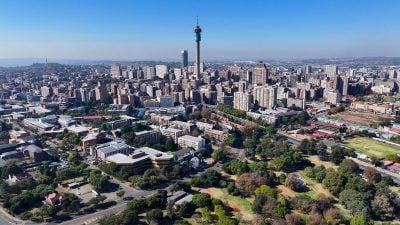The Dangote Refinery promises to transform Nigeria’s oil industry and provide an enormous boost to the Dangote Group’s revenues, but as Linus Unah reports, it may still be years before it goes into production.
In the decades since the discovery of oil in the 1950s, Nigeria has struggled to progress from merely exporting crude to transforming itself into a regional hub for refined products.
The nation’s dilapidated refineries in the cities of Port Harcourt, Kaduna and Warri are floundering. In June, the four refineries were operating at 5.5% of their combined capacity of 445,000 barrels per day (bpd), the result of decades of neglect and mismanagement.
Together, they posted an operating loss of $365m in 2018, and are only able to supply a fraction of the country’s needs. Despite being Africa’s largest oil producer, Nigeria has to import most of its fuel.
Given these realities, there was considerable optimism when billionaire Aliko Dangote announced in late 2013 that his conglomerate had signed an initial $3.3bn loan deal with local and foreign banks to fund the construction of a new oil refinery in the country. When it goes into production, the 650,000 bpd plant will produce enough refined petroleum to meet domestic needs and provide a surplus for export. However, the project has been beset by delays.
The refinery was initially expected to start production in 2016, but plans to expand its capacity and a change of location to a 2,500-hectare site in Ibeju Lekki on the outskirts of Lagos saw the deadline for completion of construction shifted to late 2019, with commencement of production expected in 2020. In August, news emerged that completion would be further delayed. Difficulties in importing “steel and other equipment” have been largely blamed for the problem, Reuters reported.
Dangote Group executive director Devakumar Edwin, who supervises the project, told Reuters that the conglomerate would reach mechanical completion before the end of next year, with fuel production expected to begin within two months of completion.
However, last year, Reuters reported that industry experts familiar with the site had said that they do not expect production to begin before 2022.
Edwin responded at the time by saying that such a delay was the product of “someone’s wild imagination”.
Dangote’s vision
The delay is a setback for Dangote, who is worth $15.5bn according to the Bloomberg Billionaires Index, and has a track record of delivering megaprojects in cement, sugar, salt, flour and packaged food.
The refinery is a key part of Dangote’s vision both for his country and his company. In an interview with Accounting and Business magazine in 2018 he claimed that when completed it would increase Dangote Group’s yearly revenue from $4bn to well over $30bn.
“The refinery will solve supply problems,” explains Tunde Ajileye, a consulting partner at SBM Intelligence, a Lagos-based political and economic risk advisory.
“It will be run as a private enterprise and hence will sell to maximise profit as well as for foreign exchange.”
Critics and supporters alike are watching the project closely. Dangote splits opinion on the continent: while some see a rags-to-riches tale of Nigerian success, others see a monopolist adept at tapping into political connections.
Dangote’s journey into Nigeria’s convoluted oil industry is one of his biggest challenges yet.
Sales of crude account for 90% of export earnings and 75% of government revenue. The economy’s dependence on oil as well as the country’s payment of subsidies to keep petrol prices low have created a huge stream of wealth for dealers and middlemen.
In 2012, a parliamentary report found that a fuel subsidy scam cost Africa’s largest oil producer $6.8bn. A slew of fuel importers, oil marketers and government officials were found to be complicit.
Challenge to vested interests
Dangote’s refinery, which will be the world’s biggest single-train facility, has the power, once it becomes operational, to push the dealers and middlemen out of the market.
It would produce sufficient petrol and kerosene to meet demands from both domestic and export markets and save billions frittered in subsidies, but risks upsetting vested interests.
“You can’t just come and remove food from their table and think they’re just going to watch you doing it,” Dangote told the Financial Times in July 2018.
“They will try all sorts of tricks. This is a very, very tough society. Only the toughest of the tough survive here.”
Yet while not all will be pleased at Dangote’s arrival, the Nigerian government is supportive and is launching a belated reform push to lay the ground for a more effective and sustainable industry.
Nigerian authorities have been working to ramp up domestic production and have set a production target of 4m bpd by 2025, and a refining capacity of 1.5m bpd.
While it believes Dangote’s refinery is key to meeting its target, the government has also created a framework to drive the sector’s growth and address key issues.
The “Seven Big Wins” was launched in late 2016 to promote better regulation, create a favourable business climate to drive robust investment. It also aimed to develop gas infrastructure, expand local refineries to supply domestic and regional markets, improve transparency and efficiency in the oil industry and help the oil-rich Niger Delta region to cut down on militancy and pipeline vandalism.
Redefining the market
“The scarce foreign exchange in Nigeria, dwindling government revenue and high levels of unemployment can significantly be confronted by strategically positioning this country as a refining hub for the sub-Saharan Africa region, where aggregate addressable market for fuels are several magnitudes above domestic consumption,” says Chijioke Mama, a Lagos-based oil and gas analyst.
If things pan out as planned, local refining capacity will eventually grow, with demands in Nigeria and the West African region being met in the next decade, reducing dependency on imports for refined products estimated at 39bn litres, according to PwC’s Nigerian unit.
“This project is most relevant for Africa, where there is a worrisomely low refining capacity,” Mama says of the Dangote oil refinery.
“Being the (reportedly) largest single location refinery in the world, it undoubtedly has the capacity to redefine the entire petroleum product market and landscape in Sub-Saharan Africa.”
Want to continue reading? Subscribe today.
You've read all your free articles for this month! Subscribe now to enjoy full access to our content.
Digital Monthly
£8.00 / month
Receive full unlimited access to our articles, opinions, podcasts and more.
Digital Yearly
£70.00 / year
Our best value offer - save £26 and gain access to all of our digital content for an entire year!
 Sign in with Google
Sign in with Google 


